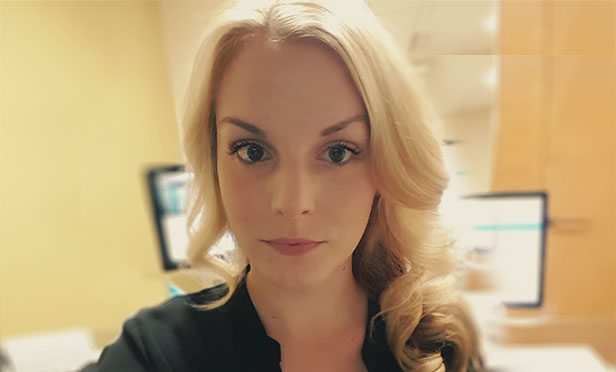 Laura Frances is a benefits consultant with InsureNW.
Laura Frances is a benefits consultant with InsureNW.Laura Frances is a benefits consultant with InsureNW, a benefits agency that utilizes an innovative benefit solutions strategy to put employer clients at a competitive advantage in attracting and retaining top-level employee talent.
Paul Wilson: How did you get started in the benefits industry?
My mother has been a broker for more than 30 years, so I grew up around benefits and health insurance. When I was seven, I was stuffing envelopes as she grew her business. I went to the University of Montana and also worked in insurance at that time doing data entry and worked at New York Life for a short time as well. But I moved back to Washington with my infant son and started working as a producer at my mom's company, where I've been producing for about eight years.
PW: How has your career so far shaped you as a consultant?
I've learned to listen. Are we living in the moment and hearing what the other person is saying, or just talking to ourselves and making assumptions? No one knows a business better than the owner, so I'm there to learn about them and who they are and see if I have solutions and can help them reach their goals. I want to make that path easier.
PW: What are the main objections you're hearing and where are they coming from?
I tend to find that employees are good with change and usually just want to know where they can turn for help, so being supportive and offering service is important. I would say we get more pushback from spouses than employees, but we try to manage that with service. Change is always hard, whether you're changing carriers or moving to reference-based pricing and the idea of not having a carrier. People can feel uncomfortable but in time, they come to understand it.
PW: Are there any specific challenges you face in your part of the country?
We deal with a lot of people coming from other countries, so they have different expectations. Understanding what they're expecting and figuring out what we can do to help meet those expectations is something we think about. They're often coming from a culture or environment where if you go to the doctor, the government pays for it. It's very different here.
HR is another challenge here in the Seattle area. There's a high turnover rate, so there are a lot of HR professionals who aren't educated about benefits. That's a big obstacle. We've seen seven HR heads pass through a large company in less than two years.
PW: How do you remain innovative without becoming distracted or neglecting daily tasks?
It's definitely hard, because there are so many cool things out there. I block out time. I'll give myself an hour for reading or researching, and then set aside a certain amount of time for a project. But you never know when you'll have an idea, read about something new or have an interesting conversation. I haven't had much problem with that balance, because I'm always learning and figuring out ways we can go forward.
PW: What are the challenges and opportunities that come with being a smaller brokerage?
I think that you're more agile, you can move quicker and you can create solutions that are best for the client. I don't have to go through a bunch of red tape, I can just create what I need. And everyone in the company has an impact. If one person isn't doing something, we all feel it. I guess that's also a potential negative. Everyone has to give their best effort to get results.
PW: How much do you collaborate with your peers across the country?
We're part of TRUE Network of Advisors and we talk to them on a daily basis; it's an amazing group. And I'm a networker, so I talk to people around Washington and other parts of the country on a weekly basis.
I'm happy to tell anyone about how we do things, because we all want to be good as an industry. We want to support our communities and have a healthy environment, and that means all of us working together.
PW: What are some of the biggest trends and issues you're watching?
Lack of transparency is a big problem in the health care system. I'm also watching what's happening in the realm of prescription drugs. The ACA isn't controlling costs or trying to lower costs; if anything, it's potentially making some things more expensive. I think that's what innovative brokers are looking at right now: How do we go in group by group and effectively manage their costs?
PW: You're close to Canada. What are your thoughts on single-payer and that movement here in the U.S.?
I don't view single-payer as a threat; I honestly believe that with every door that closes, 10 more open—just as we saw with the ACA. It's just a matter of coming up with new strategies and new ways to help people.
If single-payer does come about, there will be new and different challenges to deal with, but also new advantages. It's a matter of figuring out how to help the people you want to work with. Things are always evolving and that's a good thing. Our industry, what we do and the knowledge we have, will only become more important.
PW: Your mom has been in the industry for decades; what was her reaction to the ACA? How did your company transition?
It takes a long time and a lot of recognition to move from reactive to proactive. My mom was more reactive for a long time, and I think that's true of a lot of small business owners. Sometimes, you're living day by day. But she is a proactive person and always has a positive outlook. We try not to operate out of fear. We always try to move forward. It's nice to have a partnership where we can bounce things off of one another. That's been really helpful. When it's one person, I think it's a lot harder to make those decisions and move the team forward.
PW: What are your favorite things about your job?
I love to connect and learn about people. It's interesting to hear other perspectives and stories—learning what it took to get where they are and where they want to go. It's so cool because we all get to create whatever we want; we have a blank canvas and we're creating our dreams.
PW: How can the industry do a better job of attracting women and young consultants?
I've been on various industry boards over the years and we've often discussed this. A few times, I've just said, “Well, you're not very welcoming. You haven't tried to get to know me, and when I ask questions, the answer are often really short.” I think our industry has some problems in that regard.
Brokers tend to get into a comfort zone where we're not pushing one another enough. We need to stop viewing each other as competition and figure out how to build a better community and society. I think things will get better.
PW: Do you feel being a female in this industry has created extra challenges or that you're perceived in a certain way?
About half the time, people think I'm someone's assistant until I start talking to them. And then they're like, “Oh, maybe I should pay attention.” But if people choose to take that route, it's their loss. You never know where you're going to learn something new or who you're going to connect with. We're not in the era of brawn anymore, we're in the era of brains. So you'll really start to see women taking over in different areas.
PW: What are your sources of inspiration?
Certainly my mom; she's an amazing person. We've been through a lot as a family and I really look up to her. I've also learned a lot for myself, as well. Having kids changes who you are; I learn everyday, I work on my patience all the time and my son teaches me a lot.
I try to learn from everyone. Every conversation you have, everything you observe, if you're living in the moment, you really have an opportunity to learn. Inspiration can come from anywhere.
PW: Finish this sentence. The key to success in this industry going forward is…
Having the right attitude. It'll make or break you.
© 2025 ALM Global, LLC, All Rights Reserved. Request academic re-use from www.copyright.com. All other uses, submit a request to asset-and-logo-licensing@alm.com. For more information visit Asset & Logo Licensing.







